Healthy Holiday Eating: Navigating Thanksgiving with Your Baby
Thanksgiving is a time for family, gratitude, and food. Lots of food. But when you have a baby, the holiday can feel tricky. How do you enjoy the feast while keeping your little one healthy and happy? Don't worry!
This guide will help you have a great Thanksgiving with your baby, ensuring both you and your little one can enjoy in the festivities safely and joyfully.
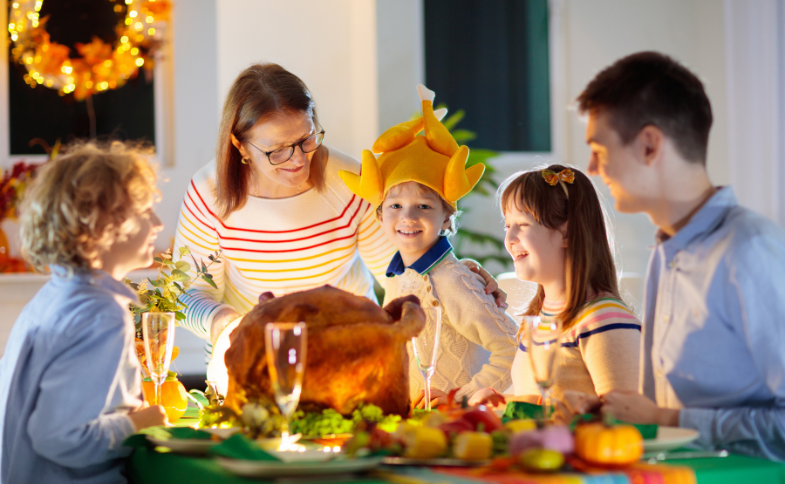
Understanding Your Baby's Needs
Before we dive into the holiday, let's talk about what your baby needs.
Age Matters
- Babies under 6 months: At this stage, babies only need breast milk or formula. Their digestive systems aren't ready for solid foods yet, so it's best to stick to their usual diet even during the holidays.
- Babies 6-12 months: This is an exciting time as babies can start trying some solid foods. However, breast milk or formula should still be their primary source of nutrition. Introduce new foods one at a time and in small quantities.
- Babies over 12 months: At this age, babies can eat more table foods. They're usually ready for a wider variety of textures and flavors, making holiday meals more inclusive for them.
Signs Your Baby is Ready for Solids
Look for these signs:
- Can sit up with little or no support
- Has good head and neck control
- Shows interest in your food (watching intently when you eat, reaching for food)
- Can move food from the front to the back of the mouth
- Has lost the tongue-thrust reflex that automatically pushes food out of the mouth
- Seems hungry even after a full feeding of breast milk or formula
Remember, every baby develops at their own pace. If you're unsure, always consult with your pediatrician.
Planning Ahead
A little planning goes a long way in ensuring a stress-free holiday with your baby. Here's what to consider:
Feeding Schedule
- Try to keep your baby's usual feeding times.
- Plan the big meal around your baby's schedule if possible.
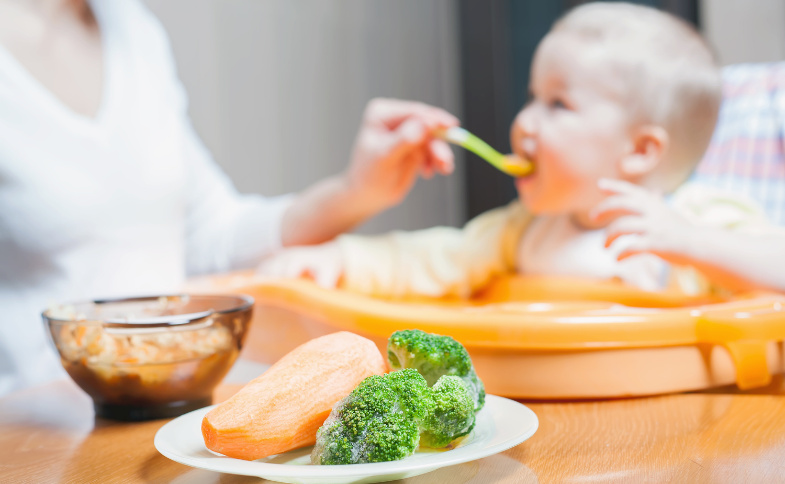
Packing Essentials
If you're going to someone else's house, pack:
- Your baby's usual food (breast milk, formula, or baby food)
- Bottles, bottle warmers, or breast pump if needed
- Bibs, burp cloths, and plenty of wipes
- A familiar plate, bowl, or spoon to make mealtime feel more normal for your baby
- A portable high chair or booster seat if the host doesn't have one
- Any medications your baby might need
- Comfort items like a favorite toy or blanket
Communicating with Hosts and Family Members
- If you're not hosting, communicate with your hosts about your baby's needs. Let them know about any dietary restrictions or allergies.
- Inform family members about your feeding choices and any new foods you're planning to introduce. This can help prevent well-meaning relatives from offering inappropriate foods to your baby.
Safe Foods for Babies
Not all Thanksgiving foods are safe for babies. Here's a guide:
Good Choices for Babies 6-12 Months
- Mashed potatoes (without added milk, butter, or gravy)
- Pureed sweet potatoes (without added sugar or marshmallows)
- Pureed pumpkin (plain, not pie filling)
- Well-cooked, mashed green beans
- Applesauce (unsweetened)
- Pureed turkey (see preparation tips below)
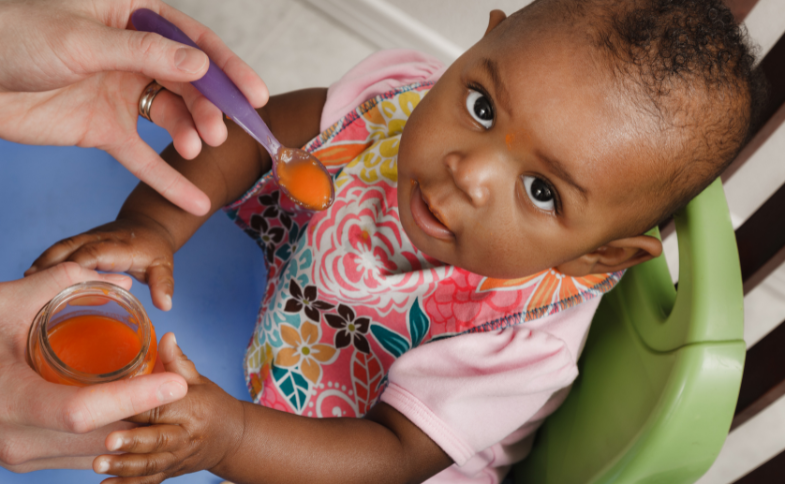
Foods to Avoid
- Raw vegetables
- Nuts and seeds
- Whole grapes
- Popcorn
- Honey (for babies under 1 year)
- Stuffing (often contains ingredients unsafe for babies)
- Cranberry sauce (too acidic and usually high in sugar)
- Pumpkin pie or other desserts (too much sugar and potential allergens)
Foods to Introduce with Caution
- Dairy products (if not already introduced)
- Eggs (potential allergen)
- Wheat products (potential allergen)
Always introduce new foods one at a time and wait a few days between new introductions to watch for any allergic reactions.
Making Baby-Friendly Thanksgiving Foods
With a little creativity, you can make some holiday foods safe and enjoyable for your baby. Here are some ideas:
Turkey Tips
- Puree small amounts of turkey with broth.
- Make sure it's very smooth for younger babies.
- For older babies, shred turkey into tiny pieces.
Veggie Ideas
- Steam and puree green beans or carrots.
- Mash cooked sweet potato without added sugar.
Fruit Options
- Mash cooked apples or pears.
- Puree cranberry sauce (homemade with less sugar is best).
Grain Options
- Offer small pieces of plain dinner roll (if wheat has been introduced).
- Make a simple rice pudding using breast milk or formula instead of cow's milk.
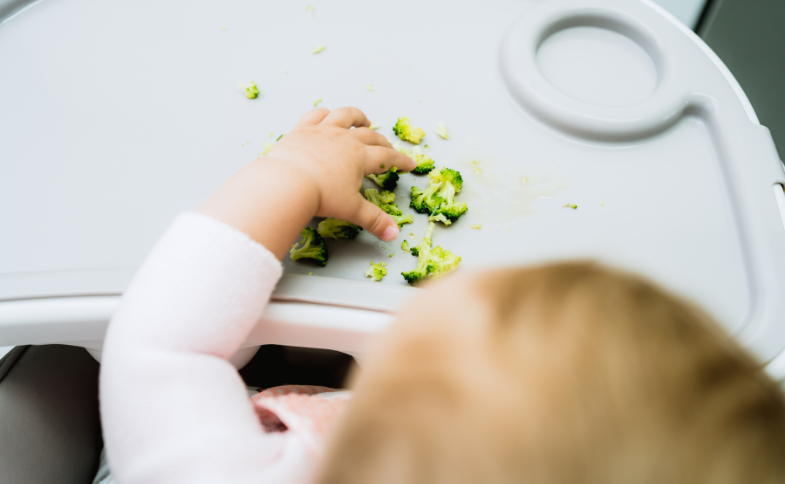
Introducing New Foods
Thanksgiving can be a chance to try new foods. But be careful:
- Stick to the “one new food at a time” rule, even during the holidays.
- Wait 3-5 days between introducing new foods to easily identify any potential allergic reactions.
- Start with very small amounts of new foods – just a taste is enough for the first try.
- Watch for signs of allergic reactions such as rash, hives, vomiting, or difficulty breathing. If you notice any of these, stop giving the new food and consult your pediatrician.
Creating a Calm Eating Environment
A peaceful setting helps your baby enjoy the meal:
- Find a quiet spot away from the main hustle and bustle of the gathering.
- Use a familiar high chair if possible, or bring a portable one from home.
- Keep distractions to a minimum – try to feed your baby before turning on the big game or when conversations are at their loudest.
- Consider setting up a small, separate area for babies and young children to eat together if there are multiple little ones at the gathering.
Dealing with Well-Meaning Relatives
Sometimes family members want to feed the baby. Here's how to handle it:
- Politely explain your feeding choices.
- Suggest other ways they can interact with the baby.
- Be firm about foods you don't want your baby to have.
Balancing Baby Care and Celebration
You deserve to enjoy the holiday too! Try these tips:
- Take turns with your partner watching the baby.
- Ask family members to help for short periods.
- Plan for quiet time if your baby gets overwhelmed.
Handling Common Challenges
Holidays can bring some tricky situations. Here's how to cope:
Overstimulation
- Watch for signs your baby is getting tired or fussy.
- Have a quiet room ready for breaks.
- Don't feel bad about leaving early if needed.
Travel Issues
- If traveling, bring familiar toys and blankets.
- Plan extra time for feeds and diaper changes.
- Try to stick to normal nap times.
Food Refusal
- Don't force your baby to eat new foods.
- Offer small tastes of safe foods.
- Remember, playing with food is normal and helps learning.
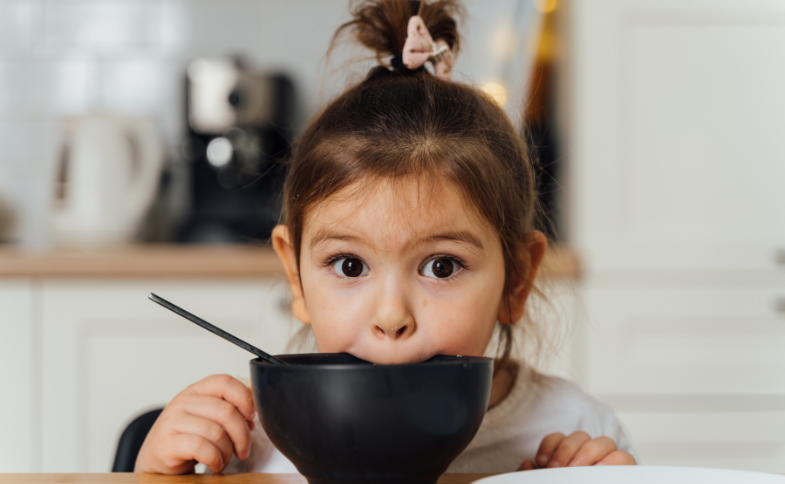
Making Memories: Involving Your Baby in Thanksgiving Traditions
Thanksgiving is about more than just food. It's a time to create special memories with your growing family:
- Take lots of pictures. Consider dressing your baby in a festive outfit for adorable photo opportunities.
- Start a Thanksgiving journal for your baby. Each year, write down what you're thankful for about your child and include a photo. This can become a cherished keepsake as they grow.
- Include your baby in family traditions when possible. For example, they can “help” set the table by playing with a plastic cup and spoon, or be present during the sharing of gratitudes.
- Create new traditions that are baby-friendly. Maybe an annual pre-dinner walk or a special song you sing together.
- Make a handprint or footprint turkey craft. This can become a yearly tradition to see how much your child has grown.
Staying Healthy
Keep everyone healthy during the holidays:
- Wash hands often, especially before feeding the baby.
- Keep your baby away from sick family members.
- Don't share utensils with your baby.
After the Big Day: Returning to Routine
The day after Thanksgiving is important too:
- Return to your normal feeding routine as quickly as possible. Consistency helps babies feel secure.
- Offer lots of water (if your baby is over 6 months) or extra breast milk/formula if your baby tried salty foods.
- Watch for any delayed reactions to new foods, such as diaper rash or changes in stool.
- Don't be surprised if your baby's sleep schedule is a bit off. Try to get back to your usual bedtime routine, but be patient if it takes a day or two.
Planning for Next Year
Think ahead to make next Thanksgiving even better:
- Note which foods your baby liked.
- Remember what worked well and what didn't.
- Consider starting your own baby-friendly traditions.
Helpful Resources on Our Site
For more information on navigating parenthood and holidays with your little one, check out these helpful articles on our site:
- How to Create a Sleep Schedule for Your Baby: This article can help you maintain your baby's sleep routine during the holiday season.
- How to Introduce Solids to Your Baby: If you're just starting solids, this guide provides valuable tips that are especially useful during holiday meals.
- How to Choose the Best Formula for Your Newborn (Organic): For formula-feeding parents, this article offers guidance on choosing the right formula, which is important to consider during holiday travel.
- Baby Milestones: What to Expect in the First Year: Understanding your baby's developmental stage can help you navigate holiday gatherings more smoothly.
- How to Track Your Baby's Growth and Development: This article can help you monitor your baby's progress, even during the busy holiday season.
- 10 Fun and Educational Games for Your Baby: These games can be great for entertaining your baby during holiday downtime.
- The Importance of Tummy Time for Infant Development: Learn how to incorporate tummy time into your holiday routine.
Final Thoughts
Celebrating Thanksgiving with your baby can be a joyful experience. It might look different from past holidays, but that's okay. Focus on what matters most – time with family and creating new traditions. With a little planning and flexibility, you can have a happy, healthy holiday that includes your little one. Remember, every baby is different. Trust your instincts and enjoy this special time. Happy Thanksgiving to you and your growing family!